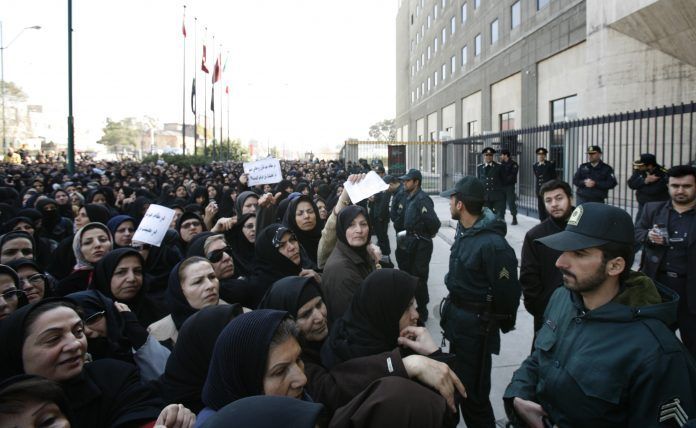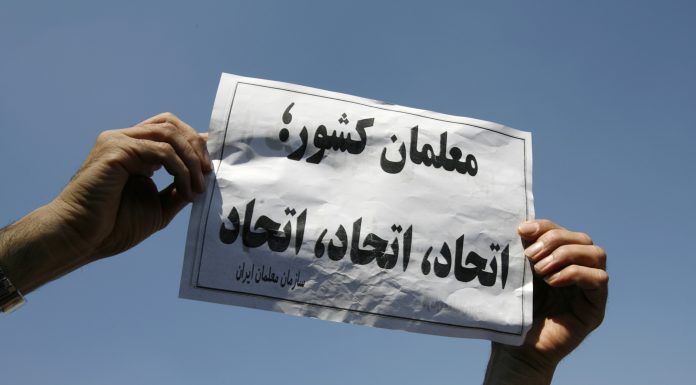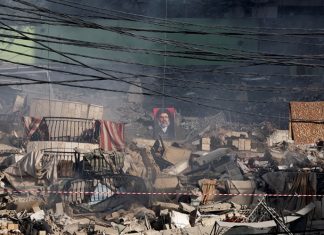
Iranian teachers staged a new wave of nationwide protest between Jan. 29 and 31. In the first two days of the protests, teachers across the country staged sit-ins in the administrative offices of their respective schools. They then marched in the streets on Jan. 31.
The protests were a continuation of demonstrations by teachers that started last summer — and more will follow. According to the Coordination Council of Iranian Cultural Associations, teachers will stage sit-ins in their respective schools from Feb. 12 to 16. They will also hold nationwide protests on Feb. 17. Teachers have said that they will not stop protesting until all their demands have been met.
During the three days of protest in late January, tens of thousands of teachers, responding to a call by the Coordination Council of Iranian Teachers’ Associations, staged sit-ins and marched in 200 Iranian cities, in what was the largest ever demonstration by any union in the country.
[aesop_image img=”https://kayhanlife.com/wp-content/uploads/2021/12/797M.jpeg” panorama=”off” credit=”Behnam Mohammadi. KL./” align=”center” lightbox=”off” captionsrc=”custom” caption=”Teachers Protest in Iran. ” captionposition=”left” revealfx=”off” overlay_revealfx=”off”]
The principal demands of the protesters were for the government to implement the “Teachers’ Pay Structure Act,” raising the salaries of working teachers to equal 80 percent of the salaries of university faculties and adjusting the pensions of retired teachers according to the cost-of-living index.
They also called on the government to provide free education and implement Article 30 of the Islamic Republic Constitution, according to which the state must “make available, free of charge, educational facilities for all up to the secondary school, and to expand free facilities for higher education up to the limits of the country’s capacity.”
Teachers also demanded payment of their annual bonus for the current year (ending on Mar. 19), implementation of the “Purchasing Educational Services Scheme,” and a thorough criminal investigation of the “misappropriation of pension funds.”
Protesting Teachers in Arak, capital of the central province of Markazi, shouted slogans including “Sit-ins, protests continue,” “No one has ever defeated educators,” and “All imprisoned teachers must be freed.” They also carried banners and placards that read: “[President Ebrahim] Raisi is illiterate, Raisi is a liar,” “Watching from behind a window will not answer our demands,” “Teacher, rise and fight against discrimination,” and “A revolutionary Majlis [Iranian Parliament] and empty promises.”
Footage shared on social media reportedly showed parents and students expressing support for the protesting teachers. Although the protests were in line with the rights of trade unions, Iranian authorities threatened and arrested a few teachers in several cities.
According to union activists, the average monthly salary of a teacher is between $180 and $222 (using the market exchange rate of 270,000 rials per dollar). Some teachers who hold a master’s degree or a doctorate get $259 a month. The monthly salary of university faculties is around $741.
The protests by teachers prompted the Majlis to pass an amendment bill to the Teachers’ Pay Structure Act. But union activists said the corresponding salary increases were “cursory” and “deceptive.” Many described the measure as the “final blow to the Teachers’ Pay Structure Act.”
Lifting U.S. Sanctions Will Not By Itself Revive Iranian Economy, Officials Say
Under the Majlis’ amendment bill, the average monthly salary of teachers will increase to $370, which is half the salary of university faculties. The salary increase passed by the Majlis will keep teachers’ income under the poverty line. According to the latest data, the poverty line in Iran is around $444. Teachers will be pushed further into poverty, given rampant inflation. Also, the salary increase will not go into effect until the Iranian New Year on March 20.
On the third day of the protest, branch-4 of the Karaj revolutionary court handed Jafar Ebrahimi — an inspector for the Coordination Council of Iranian Cultural Associations — a 54-month custodial prison sentence. Besides condemning violence against teachers, the Coordination Council of Iranian Cultural Associations has also called for the immediate release of Mr. Ebrahimi and other imprisoned teachers.
Other teachers currently jailed include Esmaeil Abdi, Hashem Khastar, Nosrat Beheshti, Nahid Fathalian, Mohammad Arkian, Hassan Hosseinkhani, and Mohammad Taghi Fallahi. The Judiciary has also filed charges against several other teachers, including Rasoul Bedaghi and Aziz Ghasemzadeh.
Education International, a global union federation that “brings together organizations of teachers and other education employees from across the world,” released a statement on Jan. 11, supporting protesting teachers in Iran.
“We condemn the arrest of Iranian teacher trade unionists and demand their immediate and unconditional release,” said David Edwards, General Secretary of Education International.
The “Teachers’ Pay Structure Act” was part of a broader “Civil Service Management Law” ratified in 2008 but has never been implemented. Under this law, the salaries of teachers working for the Ministry of Education must be raised to equal 80 percent of the salaries of university faculties.
Teachers’ union representatives had previously warned that the government’s $463 million budget for implementing the Teachers’ Pay structure Act was a “superficial” measure. They argued that the government and the Majlis planned “to kill the move to adjust the retirees pension stipulated in the Civil Service Management Law.” One of the more significant slogans by the protesting teachers was “adjust teachers’ salaries with no tricks.”
Many people believe the government will not have the funds to implement the amendment bill passed by the Majlis.
Speaking at an open session of the Majlis on Dec. 15, Arab Asadi, the deputy director of the Administrative and Recruitment Organization, said the government did not have the funds to implement the Teachers’ Pay Structure Act in the second half of the current year.
UN Urged to Open Query Into Iran’s 1988 Killings and Raisi Role






